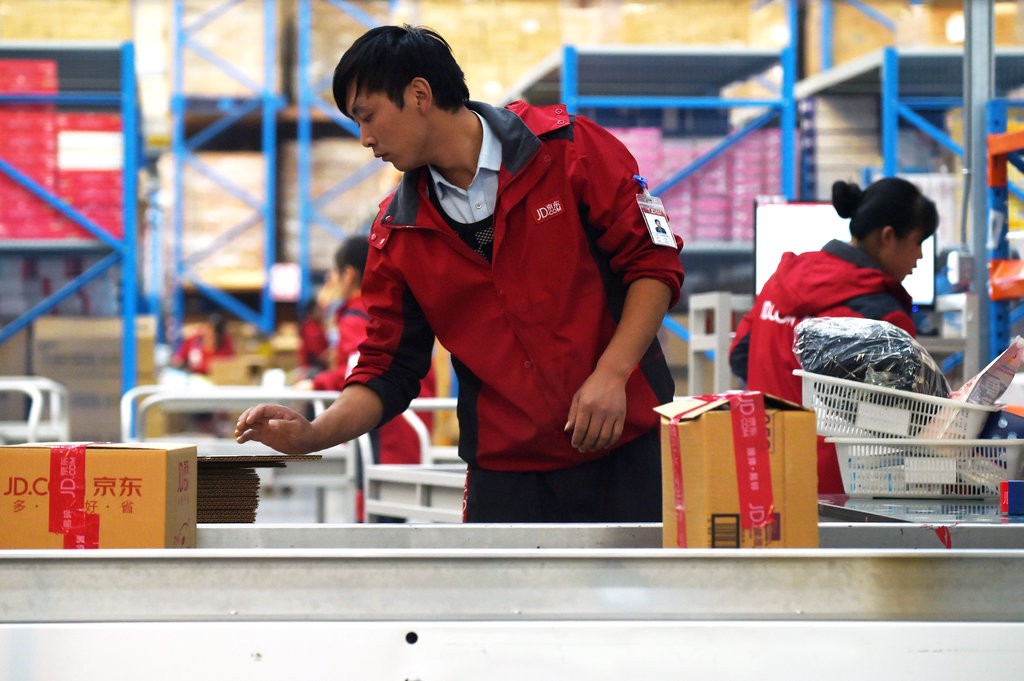Media Report

- The New York Times reports: "Google's best-known products have been blocked by the authorities in mainland China for years. If the American internet giant wants that to change someday, then half a billion dollars' worth of good will couldn't hurt. Google will invest $550 million in the Chinese online retailer JD.com, the two companies said on Monday. In return, JD.com will join the Google Shopping advertising platform, and will work with the Silicon Valley company on other e-commerce projects in Europe, Southeast Asia and the United States. The companies did not provide details of the projects. According to a JD.com spokesman, the deal will give Google less than 1 percent of the Chinese retailer's shares, which trade on the Nasdaq. Google pulled its search engine out of China in 2010, deciding that it would no longer censor its own search results as required by Beijing. But lately, the company has been looking for other ways to serve the planet's largest population of internet users."
- CNBC reports: "China responded vigorously in state media on Saturdayafter the administration of U.S. President Donald Trump said it would impose tariffs on $50 billion of Chinese imports, but some commentary left room for further negotiations. Late on Friday, China said it would impose additional 25 percent tariffs on 659 U.S. goods worth $50 billion, in response to the U.S. imposition of tariffs. "The wise man builds bridges, the fool builds walls," the official Xinhua news agency said in an editorial, echoing official comments that China would defend its interests in a trade war. "Following the path of expanding and opening up is China's best response to the trade dispute between China and the United States, and is also the responsibility that major countries should have to the world," it added."
- Bloomberg reports: "In the gritty, steamy streets of Papua New Guinea's capital Port Moresby, signs of China's push into the Pacific island nation are inescapable... "Little by little they are taking slices of our businesses," said Martyn Namorong, who campaigns to protect local jobs and communities as China ramps up infrastructure spending in the resource-rich nation, often bringing its own workforce. "My people feel we can't compete." The nation of 8 million people is the latest frontier in Beijing's bid for global influence that's included building artificial reefs in the South China Sea, a military base in Africa and an ambitious trade-and-infrastructure plan spanning three continents. China's thrust into the Pacific islands region, a collection of more than a dozen tiny nations... has the U.S. and its close ally Australia worried."
Calendar
- 2018-06-15 Tough US tariffs on China could begin as early as Friday
- 2018-06-14 Trump Says He May Upset China on Trade as U.S. Tariffs Loom
- 2018-06-13 The Unexpected Winner From the Trump-Kim Summit: China
- 2018-06-12 China suggests sanctions relief for North Korea after Trump-Kim summit
- 2018-06-11 G7 chaos is a PR win for China
- 2018-06-10 China, Russia Solidify Growing Eastern Bloc as Trump Rattles G-7
- 2018-06-08 US expands China health alert after acoustic incident
- 2018-06-07 A Medical Mystery Grows as U.S. Consulate Workers in China Fall Ill
- 2018-06-06 What Facebook Shared With Chinese Hardware Companies: DealBook Briefing
- 2018-06-05 A Trump-Kim Deal Could Send China’s Trade With North Korea Soaring
News
- The New York Times Google, Rebuilding Its Presence in China, Invests in Retailer JD.com
- CNBC China state media attack U.S. tariffs, leave scope for negotiation
- Bloomberg China's Pacific Islands Push Has the U.S. Worried
- TIME John Oliver Sends China a Message In This Catchy Song on Last Week Tonight
- The Washington Post With tariffs, Trump starts unraveling a quarter-century of U.S.-China economic ties
- Reuters China's tariffs on U.S. oil would disrupt $1 billion monthly business
- CNBC UBS Group CEO: I'm really worried about Trump-China trade war threats getting 'out of control'
- The Wall Street Journal U.S.-China Trade Standoff Weighs on Global Shares
- Business Insider China's Huawei is desperately trying to convince Australian politicians it can be trusted
- CNBC European markets lower as trade tensions rise, VW shares slip on Audi boss arrest
- Quartz The China-India rivalry is causing an ecological disaster in the Himalayas
- CNBC Asian shares decline after escalation in US-China trade tensions as oil extends losses
Commentary
- Bloomberg Don't Fear China's Industrial Juggernaut
- Forbes Lies, China And Putin: Solving The Mystery Of Wilbur Ross' Missing Fortune
- Tech Crunch Toss, Korea's top payment app, raises $40M from Sequoia China and Singapore's GIC
- Daily Beast Beijing Is Holding U.S. Citizens 'Hostage' in China
- Brookings China's social credit system spreads to more daily transactions
- Human Rights Watch China's Fast Train to Erode Hong Kong's Autonomy
- Quartz China is building its new Silk Road in space, too
